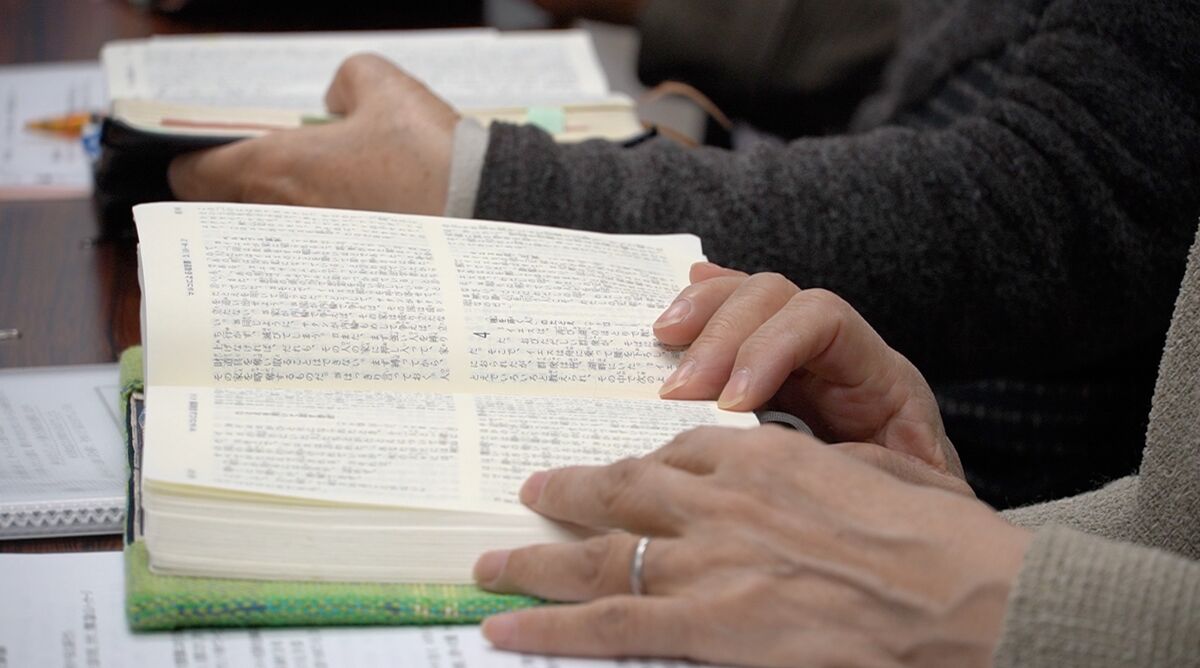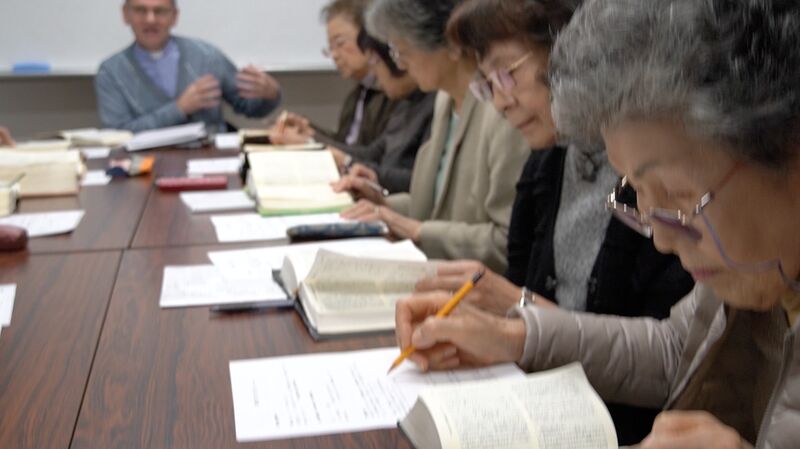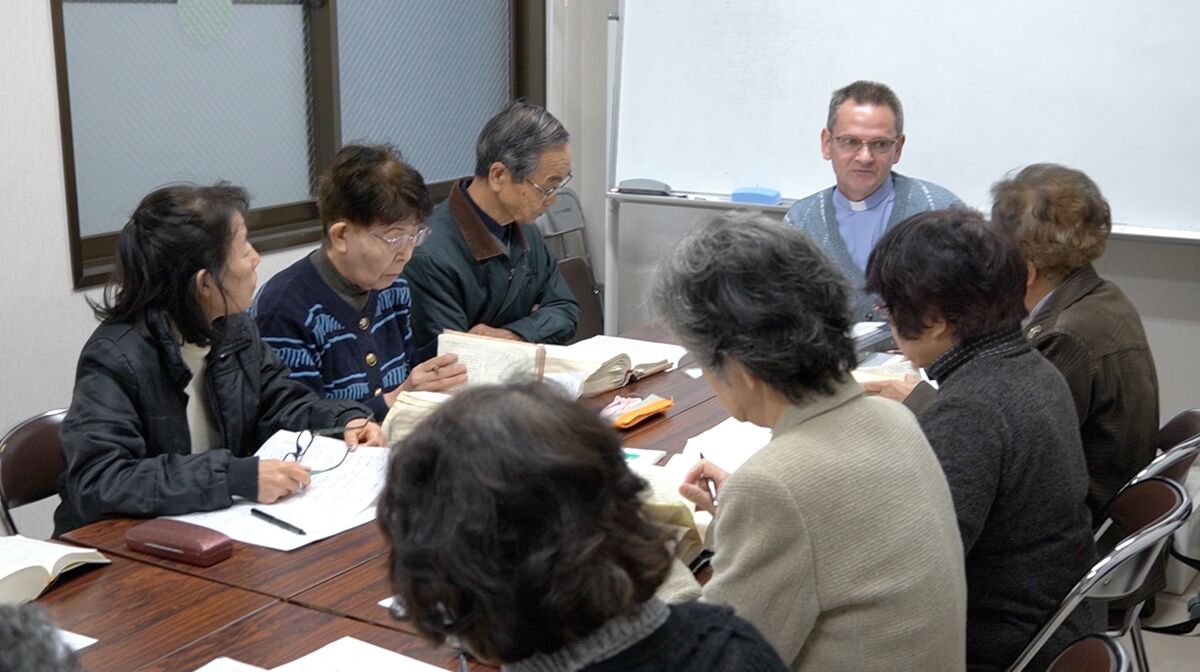Twenty Years of Missionary Work in Japan: The Power of the Word
Fr. Renato Filippini, Xaverian Missionary in Japan, studied his theology with us in the United States in Chicago, Illinois. Here, our confrere shares his missionary experience of 20 years serving the people of Japan.
Reflections and evaluations on twenty years of experience[1]

The Bible is a fascinating book read even by non-Christians and non-believers. Just think of the fascination in the various literary styles of stories or psalms. Or see the descriptions of the psychological dimension of its characters, their lights and shadows, moods, and feelings. However, for Christians, the Bible has a characteristic that goes beyond this charm: it is the Word of God. This leads readers to interact with the Word in their daily lives, and at the same time, the Bible as the Word offers them support and strength in life because it is the Word “addressed to me here and now.”
The formation of faith with the Bible
The Second Vatican Council renewed theological thought and the pastoral practice of the Church’s life. It also marked the beginning of a major shift in understanding divine revelation. Until then, when we spoke of God’s revelation, we limited ourselves to understanding the knowledge of the truths, concepts, and definitions of God and about God. The Constitution on Divine Revelation states:
It pleased God in his goodness and wisdom to reveal himself in person and to manifest the mystery of his will, through which men through Christ, the Word made flesh, have access to the Father in the Holy Spirit and are made sharers in the divine nature. With this Revelation, in fact, God invisible in his great love speaks to men and women as friends and converses with them to invite them and admit them to communion with himself. (Dei Verbum 2)
From this, it can be deduced that, through revelation, God does not only want to give men and women information about himself. By revealing himself, he wishes to invite them to dialogue with him, to enter into a personal relationship with them. Chapter 6 (nos. 21-26) of the same constitution contains a section entitled “The Bible in the Life of the Church.” It has various pastoral applications, and, among other things, it is affirmed that “the faithful must have wide access to sacred Scripture” (DV 22). One could speak of a “pastoral rule” for applying the principles of the Constitution on Revelation.
This rule has been repeatedly reaffirmed by successive popes, who have stimulated and encouraged its application in pastoral care. In the apostolic exhortation Verbum Domini, Benedict XVI wrote: “An important moment in the pastoral animation of the Church in which we can wisely rediscover the centrality of the Word of God is catechesis, which in its various forms and phases must always accompany the People of God” (VD 74). Francis also affirmed in his Apostolic Exhortation Evangelii Gaudium that “all evangelization is founded on the Word of God, heard, meditated, lived, celebrated and witnessed. Sacred Scripture is the source of evangelization. Therefore, it must be continually formed to listen to the word” (EG 174).
The formation of faith through the Bible is not limited to the study of the Bible. Although necessary and useful, the study represents only the first step in understanding the text aimed at deepening the relationship with the Word. Using expressions used in Bible meetings and groups could help increase this awareness. More than “Bible study meeting”, one could speak of “familiarization meeting with the Bible”, or “group of prayer, meditation and sharing of the Word.”

Practice and implementation of “wide access to the scriptures.”
In Japanese, we have a few books and aids to guide Bible reading. Moreover, even rare are the aids on the dimension of the Bible as the Word of God and how to cultivate the relationship with it, such as sharing, lectio divina, and the method of the seven steps. There are few opportunities for Japanese Christians to come into contact with the Word and to taste it outside of the Mass and liturgy.
In light of this situation, for about 20 years, I have created, organized, and managed formation and prayer meetings to help know and taste the Word of God.
Since 2003, annually, I have offered a series of 12 meetings of “formation in faith through the Bible.” As a material, I use the Gospels following the liturgical calendar. Each meeting lasts 90 minutes. The first 60 minutes are devoted to studying the passage in question and its context, paying attention to the questions that emerge from the text, and formulating questions addressed to the current situation of the Church and society about the Bible. The second half hour is spent in groups of four or five people discussing the Gospel passage and sharing their experiences. The same meeting is offered in the morning and evening to offer more possibilities to more people.
In May 2004, I proposed “lectio divina” to pray the Word. Since then, monthly, it has taken place at the Kagoshima Cathedral. In these 20 years, I have formed several lectio groups in the churches and districts where I have been transferred. At the beginning, I led the lectio; Later, to ensure continuity, even after my transfer, I appointed a manager to conduct subsequent meetings with the collaboration of the participants. This modality helped the lay participants understand better and better that, since the Word (not the priest) is the center of the encounter, they can always meet, pray, and share the Word among themselves. Constant attendance has become, for many, a “habitus” of ongoing formation with the Word. Every year, I propose a theme as a criterion for choosing passages of the Word[2].
Since 2014, I have published weekly on Facebook and the blog a brief reflection that leads to practical application in everyday life. Typically, the theme is a passage from the Sunday gospel or a series on the same topic. Since last year, I have been writing articles on “Today as an occasion.”
The intent is to bring the gospel of Jesus into everyone’s daily life as a stimulus to start a new day, a new week, or take on a new beginning here and now. Being the internet platform, the field is unlimited in space and time: a text posted in Japan can be read in the United States even after a year, and the diffusion of the same is multiplied through the sharing function by the readers. There is an immense and difficult-to-count range of reader types. Only those who leave a sign of their visit with a “like” or comment can be counted. Writing in Japanese, the audience is certainly selected, but simultaneously, plural: Catholics and Protestants, Christians and non-Christians, young and old, constant and casual readers, …
Church activities, including the liturgy, were also suspended during the pandemic. The company moved quickly to create new services, including food delivery. Inspired by this modality, from June 2021, on the website of the diocese of Fukuoka, I started the “Delivery of the Word on weekdays” service on the second and fourth Wednesday of the month. A passage from the Bible is presented, and a brief explanation-reflection is offered that leads to the concretization of the Word. The purpose is to encourage people to contact the Word even on weekdays. The work of editing and recording the manuscripts, as well as the preparation of the photo and the suggestion for meditation, is carried out by volunteer members of the group. This year’s series is “Praying the Psalms.”
Living the Gospel of the Lord’s Day Year A – In everyday life with the Word, published in November 2022. The book contains short meditations to savor the passage of the Sunday Gospel and offers suggestions for living the Word. It was carried out with seven lay people aged between 40 and 60 from all over the country, baptized as children and adults, single and married. All work has been done online, and we hold monthly “Word sharing” meetings.
From August 2022, “The Lunch of the Word”. It is a “banquet” that includes an hour of silent reflection with the help of three short interventions on the piece interspersed with spaces of silence in Lectio divina style. A subsequent hour of sharing in small groups. At the end, another hour of conversation with a shared lunch. Last year’s theme was “Women in the Gospel,” while this year’s theme considers the invocations of the Lord’s Prayer.

The commitment to continuity
Looking back over the last 20 years, I realized how much there is still work to be done, even among pastors and pastoral workers, to create the mentality that the formation of the faith continues throughout life. The practice of the centrality of sacramental pastoral care, that is, aimed at preparing the sacraments, has spread the idea of completing the formation of the faith with the reception of the sacraments.
But faith formation is a process that accompanies life; there is no point of arrival. On the contrary, it is a continuous process. It is called lifelong learning or, with specialized vocabulary, ongoing formation or lifelong learning. This is precisely the meaning of forming faith through the Bible, personal and constant contact with the Word to live it daily.
Transformative Process of the Word
Continuity in formation is the necessary condition for the journey to becoming a process of growth that begins “from” and leads “to.” This passage, being a transformative process, implies at the same time continuity and discontinuity in its becoming. Within the same path, different steps intertwine and interact, a sign and proof of the path of growth in progress. Three levels can be distinguished: the level of information, the training level, and finally, the performative level. These three levels are interconnected and are seen as a spiral that goes deeper and deeper. This process of transformation is, at the same time, the fruit that also becomes the criterion for evaluating the growth and formation of the faith, which in turn forms and matures the Christian in the life of faith.
a) From the Bible to the Word
The level of information that of study is the first step, necessary but not sufficient. Even an atheist can study the Bible, but only Christians can read it as the Word of God. In our activities of first proclamation and catechesis with adults, we must combine the didactic style, which offers information about the Bible, with a pedagogical style through which the participants can interact with the Bible, each according to the phase of life in which they find themselves. The Bible is not a text of rules or teachings to be learned, but a collection of stories of people who have lived their bond with God in daily life and his vicissitudes, and invite the reader to do the same, according to the words of Psalm 119, “Lamp to my feet is your Word, light to my path.”
b) From meditation to sharing
At the formative level, the relationship between Word and the reader begins. This relationship develops through meditation and personal reflection in a climate of silence that concretely takes place when everyone is with the Word, conversing, dwelling in it, and meditating on it. The Word is assumed into one’s own life; it is personalized, that is, it becomes part of the values of life that orient life itself. This personal dimension should naturally be followed by the community dimension, i.e., sharing. From the same passage of the Word arise different and plural perspectives in the light of each one’s life situation. Sharing enriches and makes us experience the efficacy of the Word because it addresses and converses with each participant, who in turn shares with others what has been meditated and received.
c) From contemplation to action
Spending time in silence with and in the Word leads to remaining in it. However, there is a real risk that it could become an intimate relationship, closed in on itself when it should be sent into everyday life. Interacting with the Word leads to the performative level as the breathing cycle is to inhale and exhale. Through contemplation, we are drawn into the Word. By committing ourselves to living the Word, it sends us, sends us into everyday life to incarnate it through concrete actions and gestures.
This transformative process begins with those who accept and accept that invitation. A relationship is born, strengthened, and consolidated through a constant and periodic interaction with the Word. Biblical paths of various kinds and methods become an opportunity for the continuous growth of faith. The practice of promoting wide access to the scriptures makes the hearts burn not only for those who listen.[3]
[1] Translation and adaptation of two articles by the author published in the June and July 2023 issues of “Seibo no Kishi“, the monthly magazine of the conventual friars in Japan.
[2] A selection of over 200 meetings has been published in 3 volumes of the “Lectio Divina” series. Each booklet presents 24 passages, grouped into various themes, including the encounters of Jesus in the Gospel, the invocations of Our Father and the Beatitudes, the Psalms, and others. On the occasion of 20 years of practice of “praying the Word,” the fourth volume entitled “The Kingdom of God is among you. Signs and words of the Kingdom”, Gospel passages of healings, and texts of parables.
[3] I dedicate this writing to Father Vincenzo Munari, my novitiate master (Ancona 1989-1990), who introduced me to the practice of lectio divina. To Father Renzo Larcher, my Bible teacher (Parma 1990-1992), who transmitted the passion for the Scriptures to me.

